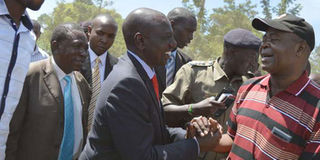Kericho poses litmus test for Ruto’s stature

Deputy President William Ruto is received by former Malava MP Soita Shitanda on arrival at Chebwai SDA Church on February 28, 2016 during a harambee in aid of the church in Kakamega County. PHOTO | ISAAC WALE | NATION MEDIA GROUP
What you need to know:
- The argument is that Mr Ruto should show how his vice-presidency has benefited the Kalenjin nation before he can engage them in debate over the post-Kenyatta era.
- Kanu has three senators: Mr Moi, Prof John Lonyangapuo (Pokot) and Mrs Zipporah Kittony (nominated), who have been leading the party’s campaigns for former Health Minister Paul Sang.
Deputy President William Ruto has been one busy and restless man.
For the past two weeks, he has made trips to Malindi and Kericho counties where he has staked all to ensure his Jubilee Party wins the two critical seats in the National Assembly and Senate, respectively.
He has been to Malindi thrice and on Saturday made the fourth tour in a whistle-stop campaign blitz in Kericho, in less than two weeks.
The elections have thrown Mr Ruto into a fire-fighting mode at the height of political drama out of accusations that put senior members of his party at the centre of the National Youth Service corruption scandal, which has embarrassed the Kenyatta administration.
Former Devolution Cabinet secretary Anne Waiguru has pointed fingers at National Assembly Majority Leader Aden Duale, Senate Deputy Majority Leader Kipchumba Murkomen, and Mr Ruto’s aide, Farouk Kibet over brazen theft of NYS millions.
The two politicians have laughed off the accusations and declared an all-out war, which threatens to be ugly and which could shake the foundations of the ruling coalition.
It is apparent that the deputy President has taken the battle for the seats as his responsibility, probably because of the circumstances under which they fell vacant and the political consequences should the Jubilee coalition lose, particularly in Kericho.
It is noteworthy that the by-elections arose after Mr Ruto hand-picked Kericho Senator Charles Keter for the Energy ministry and seduced Malindi MP Dan Kazungu for appointment as Mining Cabinet secretary.
Mr Ruto was filling posts that were assigned to his United Republican Party wing of the Jubilee Coalition and which were occupied by Mr Davis Chirchir (Energy) and Coast politician Kazungu Kambi (Labour), who were kicked out in a corruption related purge.
And by appointing Senator Keter, the DP was trying to stem a revolt in the South Rift spearheaded by Bomet Governor Isaac Ruto.
UNFULFILLED PLEDGES
But in an unexpected turn of events, the Kericho by-election has been turned into a referendum on the Deputy President, hinged on his pre-election pledges to the South Rift and resentment by Kalenjin politicians of his patronising attitude and sense of entitlement.
It was not imaginable that Mr Ruto would be putting up a spirited fight to reclaim a seat he himself made vacant in a region that voted for him to the last man in the 2013 election.
In every sense, a loss in Kericho to a resurgent Kanu, led by Baringo Senator Gideon Moi, will be devastating for the DP, who has been keen to project the Kalenjin Rift — whose support he used to bargain for a power sharing deal with President Kenyatta — as being under lock and key.
According to Mr Stanley Rotich, an engineer by profession and a politician from the South Rift, the Kericho by-election has served as an opportunity for the Kipsigis, who constitute more than 60 per cent of the Kalenjin vote, “to remind Mr Ruto that we cannot be taken for a ride”.
“The Deputy President is also on the receiving end because local MPs abandoned the people and started representing him,” argues Mr Rotich.
At the centre of the grievances in the South Rift is a long list of unfulfilled promises on road construction, expansion of hospitals and agriculture, as well as a seeming fatigue with constant pronouncements over his intention to be President after Mr Kenyatta.
The argument is that Mr Ruto should show how his vice-presidency has benefited the Kalenjin nation before he can engage them in debate over the post-Kenyatta era.
Argues Mr Rotich: “The Ruto vice-presidency has polarised the community. It has created a monster who brooks no opposition and has no regard.”
Moreover, the putrid exchange between Mr Ruto and the younger Moi risks denying the Jubilee coalition critical support in the Senate, where the margin with the Opposition is significantly narrow.
NEPOTISM
Kanu has three senators: Mr Moi, Prof John Lonyangapuo (Pokot) and Mrs Zipporah Kittony (nominated), who have been leading the party’s campaigns for former Health Minister Paul Sang.
Kericho residents are particularly uncomfortable with the appointment of the Mr Keter’ relatives to government at the expense of other qualified professionals from the region.
Matters have also been complicated following revelations that JAP candidate Aaron Cheruiyot is Mr Keter’s nephew.
Even then, the DP has defended the appointments, saying the officers were qualified and that the did not know that they were Mr Keter’s relatives.
The DP specifically mentioned Dr Ken Sigilai, who chairs the Kenya Electricity Transmission Company, Ms Betty Maina, the principal secretary for the East African Community and her Industrialisation counterpart Julius Korir.
However, Mr Ruto has accused the Kanu brigade of being used by the Opposition to divide the Kalenjin vote and hurt his 2022 presidential ambitions.
Mr Ruto has also apologised to Kericho residents over the unfulfilled election promises.
The March 7 by-election will show whether the apology was accepted or not.





